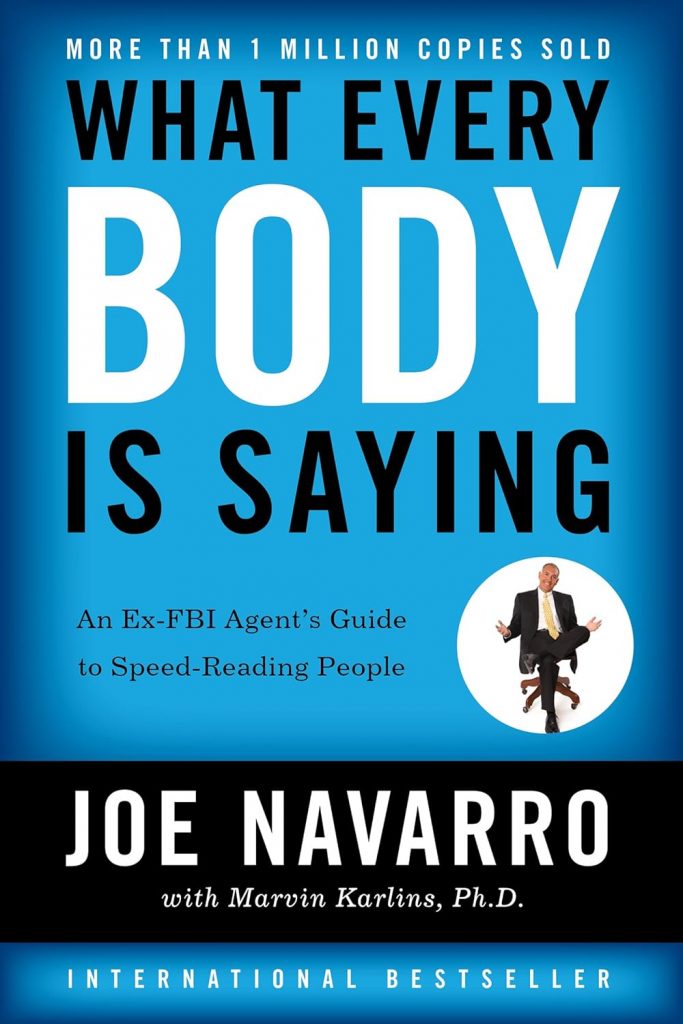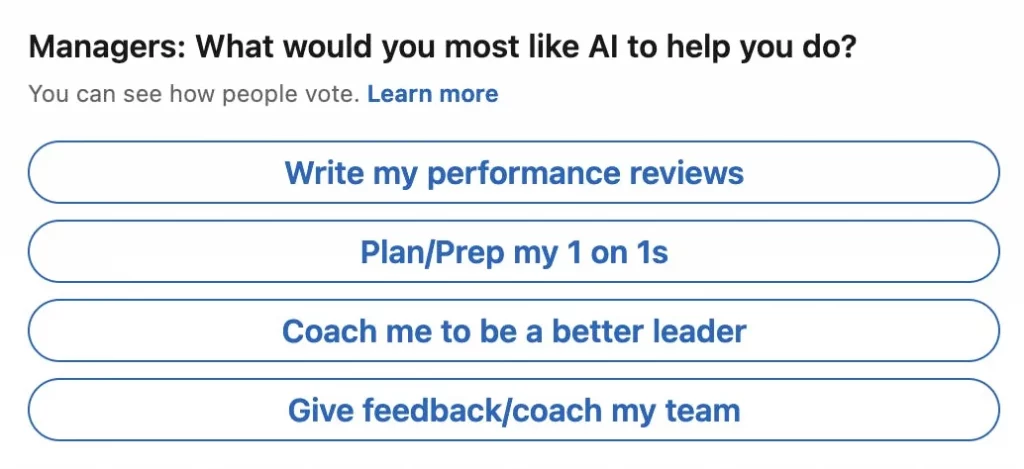In today’s edition, we also cover a new Book of the Month, a special opportunity for those of you with audiences of your own, a new foundational post on coaching, and an important poll to tell us what you think of AI for leaders.
Let’s dive in…
Table of contents:
- 🥘 Food for Thought on a True, Inspirational Classic
- 📚 Book of the Month on Learning a Language All Leaders Should Know
- 🤝 A special offer for Thought Leaders and Coaches
- ❓ Poll of the Week on AI to Help You be a Better Manager?
➡️ Did a friend forward this to you? Get every issue straight to your inbox by signing up here.

🥘 Food for Thought
"For the past 33 years, I have looked in the mirror every morning and asked myself: “If today were the last day of my life, would I want to do what I am about to do today?” And whenever the answer has been “No” for too many days in a row, I know I need to change something." - Steve Jobs, founder of Apple
With it being graduation season right now, it had me re-watching some of my all-time, favorite commencement speeches.
And any list of great commencement speeches must include the Steve Jobs speech at Stanford in 2005:
It's worth the full 15 minutes to watch, and I'd like to call out a few of the best lines from it that apply to leaders:
1) It's okay to take detours.
"...looking back it was one of the best decisions I ever made. The minute I dropped out I could stop taking the required classes that didn’t interest me, and begin dropping in on the ones that looked interesting...much of what I stumbled into by following my curiosity and intuition turned out to be priceless later on."
Famously, Steve Jobs dropped out of college. He was one of the first in what is a historic line of well-known tech founders who dropped out of school.
Yet, unlike most of the other dropouts, Steve kept going to classes.
Which as fate would have it led him to take a calligraphy class, which came in handy when they were designing fonts and the user experience on the then revolutionary Macintosh computer:

As Steve put it, "If I had never dropped in on that single course in college, the Mac would have never had multiple typefaces or proportionally spaced fonts."
The Lesson for Leaders:
Even if you're mid or late in your career, keep your interests and hobbies going. Learning things you're interested in can lead to all kinds of exciting opportunities you can't foresee.
Remember: Steve took that class, and then didn't use his knowledge of fonts from his calligraphy class until 10 years later.
What passion do you have that you're not giving some of your time and attention?
You never know where it might pay off, but I've seen examples personally like:
- A friend found their next job because of the obscure interest they had that was shared by the executive that recruited them.
- A CTO was recruited to their next job based on the interesting work they'd done on a side project (that otherwise appeared to go nowhere)
- A teammate on an old soccer team found that the same people that played soccer at a high level were often great sources for recruiting.
You also may be surprised how many great friends you can make when you cultivate your interests, even if just a few hours a month. And you don't have to change jobs either; often side projects and hobbies can be just as valuable building rapport with your current peers or bringing fresh ideas to the company you already enjoy working at.
2) Trust the process of life.
"You can’t connect the dots looking forward; you can only connect them looking backward. So you have to trust that the dots will somehow connect in your future. You have to trust in something — your gut, destiny, life, karma, whatever. This approach has never let me down, and it has made all the difference in my life."
Calligraphy wasn't the only time Steve had a moment that at the time didn't make sense, but later worked out and was crucial to his life. He also by chance met the founders of Pixar (which wouldn't exist today without his millions in early investment), fortuitously recruited some life changing early hires at Apple, and most notably had a huge redemption arc after being fired from Apple:
"Getting fired from Apple was the best thing that could have ever happened to me. The heaviness of being successful was replaced by the lightness of being a beginner again, less sure about everything. It freed me to enter one of the most creative periods of my life."
Getting fired from the business you helped build from scratch had to be gut wrenching. Yet, if you've read any of Jobs's biographies, you know that it was totally justified. He was impulsive, disruptive, and at times put the entire company at risk leading up to when he was fired.
Thankfully, Jobs overcame all of that to start again. The growth and learning from that experience made him into the executive he became in his triumphant return to Apple, which he never would have been forced to grow into if he had stayed at Apple uninterrupted.
The Lesson for Leaders:
Whether it's you being fired/quitting, or you need to do the firing or accepting the resignation of someone else, realize that sometimes it's necessary. It may be scary and stressful, but often that's exactly what you or your team member needs.
Whether it's a wake up call, or clearing the way for a new opportunity, embracing the idea of connecting the dots later can be incredibly liberating.
For example, I remember being laid off from my first real job in tech. It was scary and frustrating. I then proceeded to try to start a company around making tools for product managers. That totally flopped. I got zero traction.
Yet, looking back, the dot connecting is incredible:
- One of the investors in the startup I was laid off from had been mentoring me on monthly calls. He kept an eye on me on Twitter after losing my job.
- I tweeted about my progress on the product management tool and used it to source people to interview.
- He and I both were invited to a conference many months later and reconnected over drinks.
- As fate would have it, he had fired the product manager at his startup shortly before heading to the conference.
- A lengthy conversation about the merits of moving to Silicon Valley turned into, "You could come work for me."
- 2 months later, I was interviewing for the PM job, and absolutely crushed it by talking about the good, the bad, and the ugly I had learned from interviewing all those product managers for the tool that hadn't worked.
- He hired me on the spot and I moved to SF a month later, transforming my career and unlocking massive personal growth.
Getting laid off from a company that cratered was no fun. Neither was working on a startup idea that went nowhere.
I was very broke for those 6 months, too. I basically lived on PB&J's and ground turkey meat during that time.
Yet, doing my best on some mentorship calls, and working on a failed idea, was exactly why I unlocked the next great opportunity for me.
How can you turn your next setback into a great opportunity?
3) Do you LOVE your work?
"Sometimes life hits you in the head with a brick. Don’t lose faith. I’m convinced that the only thing that kept me going was that I loved what I did. You’ve got to find what you love....Your work is going to fill a large part of your life, and the only way to be truly satisfied is to do what you believe is great work. And the only way to do great work is to love what you do. If you haven’t found it yet, keep looking. Don’t settle. "
If there's one thing Jobs is known for, I think it would be his passion. His enthusiasm for the products he helped create is legendary. The way people hung on his every word at Apple launch events is a testament to this.
Yet, even he challenged himself to stick to that principle as he remarked:
"For the past 33 years, I have looked in the mirror every morning and asked myself: “If today were the last day of my life, would I want to do what I am about to do today?” And whenever the answer has been “No” for too many days in a row, I know I need to change something."
You can see this in how Jobs shifted his focus over the years to various projects and products that ignited his passion. But he never let them take him over completely, which allowed him to move from one innovation to the next, seemingly always at just the right time.
This seems particularly relevant when he stopped focusing on the iPod and started trying to make the iPhone a reality. And this shift happened just as the technology to make the iPhone a reality was just barely becoming available (and sometimes Apple had to invent it!)
The Lesson for Leaders:
You don't have to be the CEO of a massive company like Jobs to do what you love. We can all be craftsmen and craftswomen, deeply proud of our work.
That's why it's important to take stock as Steve did asking if you want to be doing what you're doing today.
If the answer is no, start working on your exit plan. Life is too short to drag yourself through a job, especially as a leader. Remember: How you feel is passed on to your team. They deserve a manager happy to be there, too.
And this should also apply to your team. If you see a team member who clearly hates it at your company or is miscast in their role, help them find a better one, whether at your company or another. The karma you'll get for helping them will pay you back many times over, and your team will be better for it, too.
Jobs put it best when he said:
"Your time is limited, so don’t waste it living someone else’s life. Don’t be trapped by dogma — which is living with the results of other people’s thinking. Don’t let the noise of others’ opinions drown out your own inner voice. And most important, have the courage to follow your heart and intuition. They somehow already know what you truly want to become. Everything else is secondary."
Are you and your team following your heart and intuition?
📚 Book of the Month on Learning a Language All Leaders Should Know
How many languages do you speak? Some of you I've spoken with need two hands to count. Others are like me, speaking 1 language and vaguely remembering one from school.
Yet, there's one language I think every manager should understand: Body Language.
Body language is super valuable for you to learn and understand, because it gives you a variety of helpful insights and context like:
- Noticing when someone is uncomfortable
- Seeing when someone has something to say (call on them!)
- Recognizing emotions your team has before they have to tell you
- Detecting tension and seeing when people on your team may not be getting along
- Understanding your own body language and using it to your advantage
That last one is one I think you may not have considered, so consider this:
- You can change your body language from closed to open, and it will make you feel more open
- If you smile when you're on the phone, your voice will become higher energy
And all of this is just scratching the surface of the power and value of understanding body language.
That's why this month's Book of the Month is my favorite source for learning about body language: What Every Body is Saying.

I read this book early in my career and it felt as transformative as when I learned to read as a child; just like suddenly road signs were not a mystery to me anymore, I could suddenly see body language signs all around me.
I knew who was having a good or bad conversation at the bar, saw workplace relationships in a new light, and better understood myself and what I was conveying.
And all of this is thanks to the book, What Every Body is Saying.
It's a practical, fun, and pretty easy read, filled with memorable stories, and lessons you'll be able to apply at work right away.
So if you don't know this language yet, make sure to pick up a copy of this month's Book of the Month.
>> Get What Every Body is Saying here. 📚
🤝 A special offer for Thought Leaders and Coaches
A wide variety of leaders, writers, managers, executives, founders, and coaches subscribe to this newsletter. We're excited to help all of you grow as leaders, and teach others.
Today, we're opening up an offer to those of you with your own newsletter/email lists, clients you coach, or otherwise work with audiences of leaders, too.
The offer is as follows:
- If you promote our Lighthouse Lessons courses to your audience, we'll give you a generous revenue share for any courses sold to them.
Interested? All you have to do is reply to this email, and we can discuss specifics, answer your questions, and explore a few bonus opportunities depending on your audience.
❓ Poll of the week
With AI growing in popularity, the Lighthouse team and I are taking a look at what custom AI might be interesting to you and other leaders.
With that in mind, we have a simple poll we'd love your vote on:

Which do you wish AI would help you with? (Or maybe you're trying an AI already doing one of these now?) Either way, help us understand what people want or don't, and vote here.
A non-vote tells us it's not interesting to you, so if you want any of those to exist...vote!
If a friend sent this to you, sign up here to get this newsletter every Saturday morning: https://getlighthouse.ck.page/9aa103e62f
Thanks,
Jason
Jason Evanish
CEO, Get Lighthouse, Inc
PS: If you're interested in promoting Lighthouse Lessons to your audience, reply to discuss timing, options, and to answer your questions.
Sign up to get this newsletter & our latest blog posts straight to your inbox:




